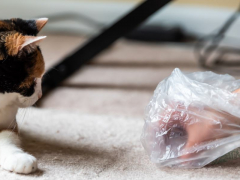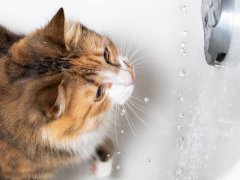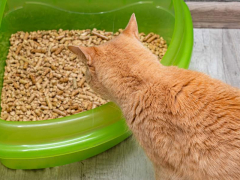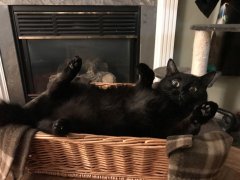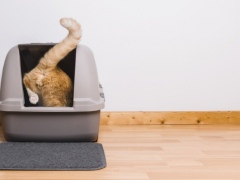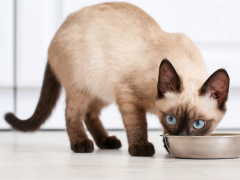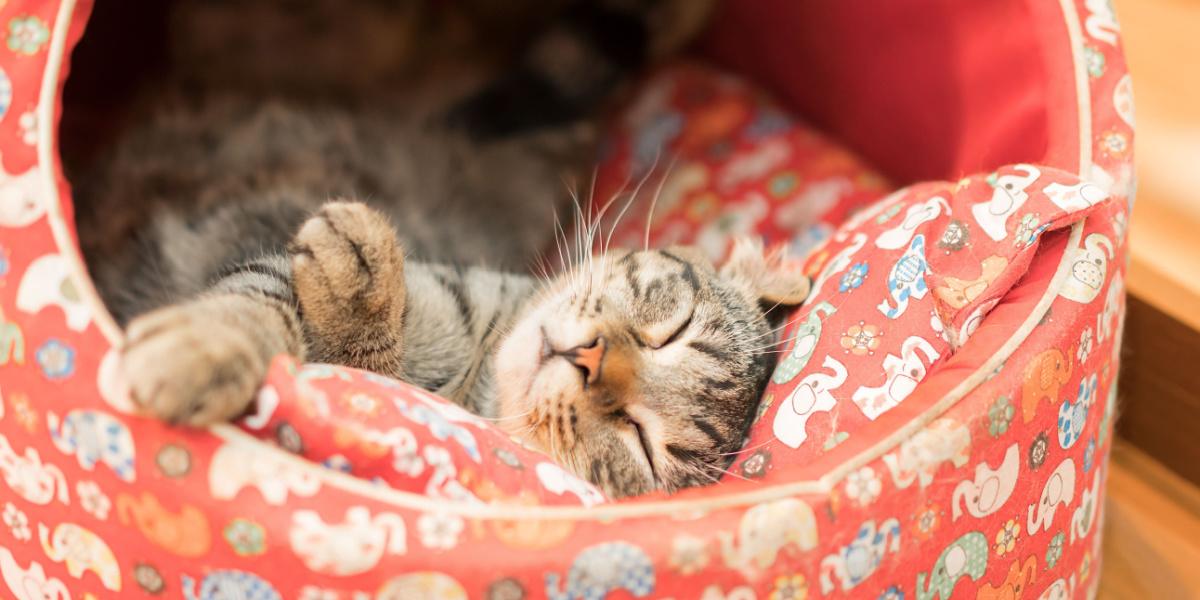
Cats can behave in strange and puzzling ways, but their quirky personalities are part of what makes them so lovable. So how do we know if our cats‘ bizarre acts are normal feline behaviors or something to worry about?
In this article, we will discuss nine cat behaviors you should never ignore as they could indicate a serious medical, emotional, or physical problem. It is really important to get your cat checked by their veterinarian if you notice these (or any other) changes in their behavior.
1. Altered Sleep Patterns
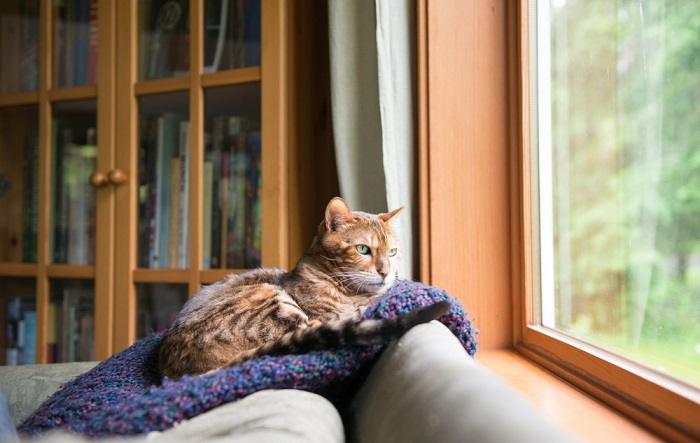
It’s important to note changes in your cat’s sleep, including where they sleep, when they sleep, and whether they are sleeping more than usual.
Cats sleep a lot. In fact, many cats sleep up to 18 hours a day, so if yours always seems to be snoozing it isn’t necessarily anything to worry about. A change in the amount, timing, or location of your cat’s naps can indicate a problem though and should be checked out by your veterinarian. Many illnesses, especially those causing a fever, can make your cat feel more lethargic and sleepy than normal.
You might notice that your cat doesn‘t curl up for naps in their favorite high place anymore. Cats suffering from pain, especially joint pain caused by arthritis, struggle to jump and climb and might opt for more easily accessible locations to sleep in.
Feline cognitive dysfunction syndrome (FCDS), also known as dementia, can cause various behavioral changes in cats as they age, including altered sleep patterns. Affected cats are often awake at unusual times, unfortunately resulting in their owners being woken up in the middle of the night, too. Stress and anxiety can also alter sleeping patterns.
Also Read: Why Do Cats Sleep With Their Head Up?
2. Change in Toileting Habits
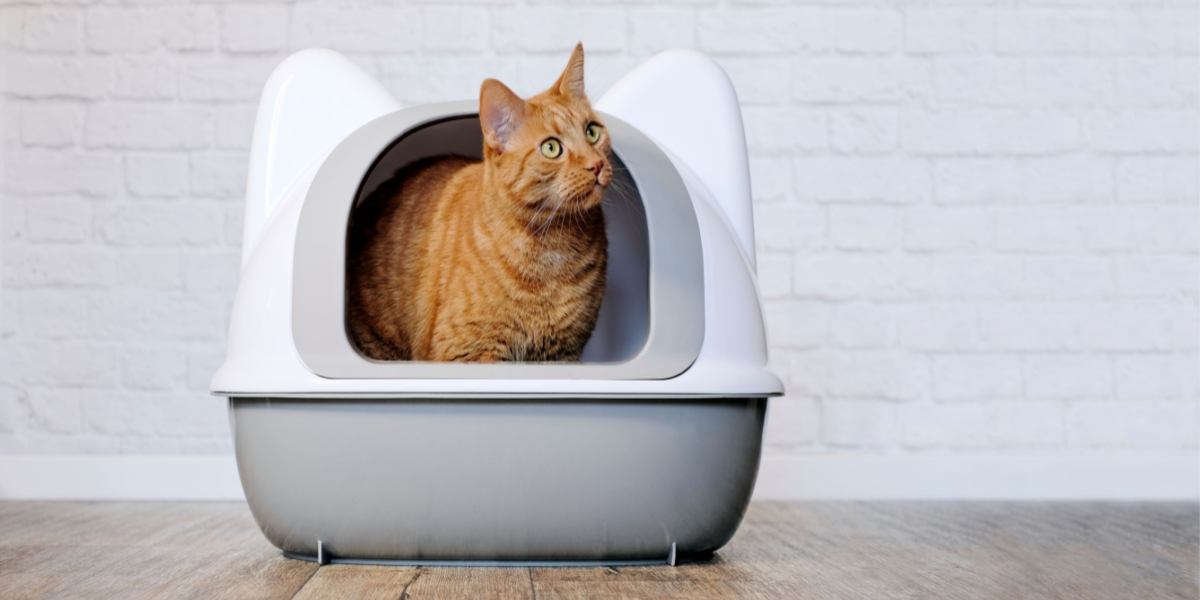
Not using the litter box always needs veterinary intervention as many medical and behavioral issues cause inappropriate elimination.
House soiling is a common behavioral issue in cats and is one of the top reasons for them being relinquished to animal shelters. If your cat stops using the litter box, or starts peeing and pooping in undesirable places around the house, it is a sign that their physical, social, and/or medical needs are not being met, so speak to your veterinarian sooner rather than later.
It could be that your litter box management isn’t up to scratch, or that your cat is stressed, or anxious over their territory. House soiling can also be caused by medical conditions such as urinary tract diseases and feline dementia. Cats that experience pain while using their litter box due to urinary tract infections, constipation, diarrhea, or joint pain might avoid using the litter box, as they associate it with discomfort.
If your cat stops urinating altogether it might be a sign of a urinary blockage (urethral obstruction), which is a life-threatening emergency that requires urgent medical attention.
Also Read: 11 Best Cat Litter Boxes In 2022 – We Tried Them All
3. Increased Vocalization
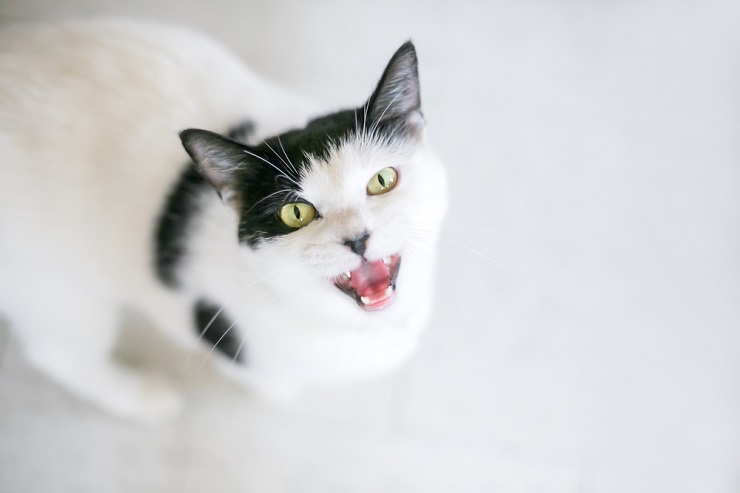
A sudden increase in vocalization could be a sign of pain, stress, or another medical or behavioral problem.
Some cats are naturally “chattier” than others. Oriental breeds such as the Siamese cat are renowned for being very vocal, and it has been shown that purebred cats are more vocally communicative than mixed breeds. So having a vocal cat is nothing in itself to worry about, but if your cat suddenly starts to meow more, or seems to be forever yowling at you, then schedule them for a health check as it could be a sign they are suffering from one of the following:
- Hearing loss
- Feline cognitive dysfunction syndrome
- Stress
- Hyperthyroidism
- Pain
- Separation anxiety
Also Read: Excessive Meowing In Cats Explained (Causes And Solutions)
4. Increase in Appetite or Thirst
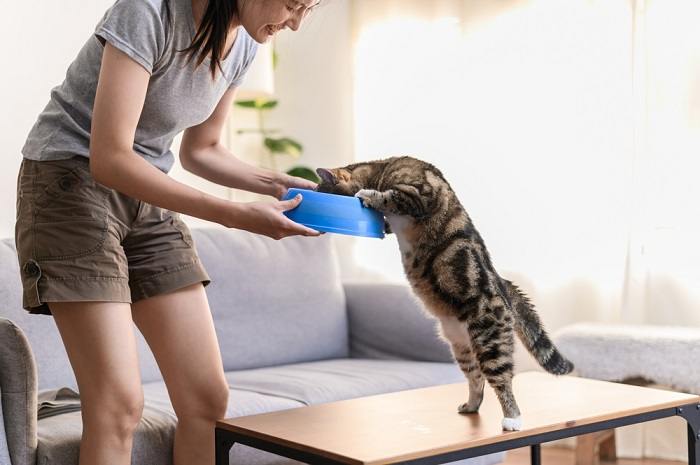
Cats with changes in appetite and/or thirst should see a veterinarian, who might recommend blood and urine tests.
Is your cat pestering you constantly for food or water? A ravenous appetite can cause your cat to act very out of character and can have many causes, including underlying medical conditions like hyperthyroidism, inflammatory bowel disease, diabetes, and intestinal worms. You might also notice that your cat gains or loses weight, along with a change in behavior.
Polydipsia is the term used when cats are excessively thirsty and begin drinking too much water. It can have several underlying causes including diabetes, hyperthyroidism, and liver and kidney disease. Affected cats might spend a lot of time at their water bowls drinking, and might also be seen drinking from unusual places like sinks, baths, or even toilets.
Cats with changes in appetite and/or thirst require a visit to their veterinarian, who will usually want to run some blood and urine tests to diagnose what is wrong.
Also Read: What Can Cats Drink Besides Water?
5. A Change in Grooming Habits
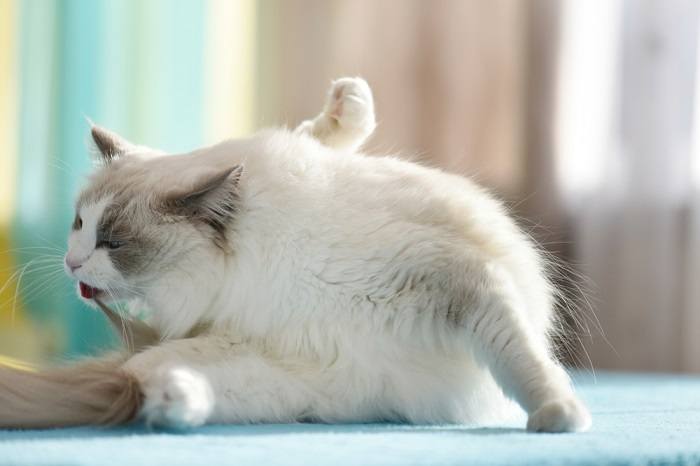
Some cats over-groom to the point that they lose their hair in some places.
Grooming themselves more (over-grooming) is another behavior in cats that should not be ignored. You might notice your kitty licking, biting, or scratching themselves excessively, however, some cats chose to groom themselves in private, so you might just see hair loss, or lesions like sores and scabs.
Over-grooming can be caused by skin diseases such as allergies, fleas, stress, and anxiety. Licking focused over a specific area can indicate pain, for example, cats with bladder discomfort might lick their bellies.
Pain or illness can also result in cats grooming themselves less than normal resulting in matted, scruffy, unkempt fur (especially if they are suffering from oral pain, such as that caused by dental disease). Either way, if you see a change in your cat’s grooming behavior, you should get them checked out by a veterinarian.
Also Read: What Can You Give A Cat For Pain? 6 Vet-Recommended Options
6. Staring at the Wall
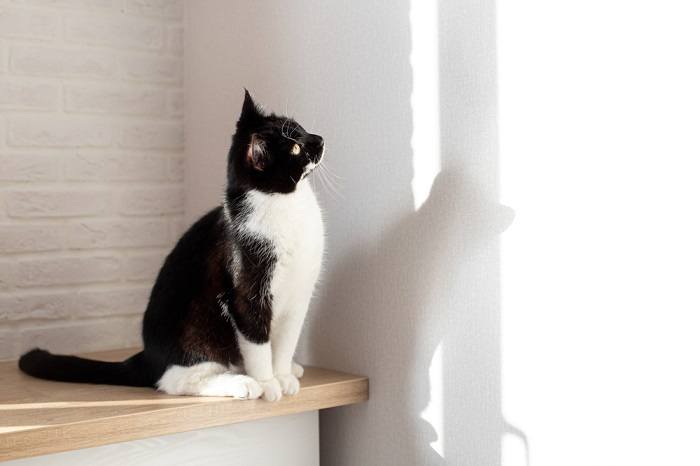
Staring at walls or pressing their head against the wall could be a sign of a medical issue like dementia, epilepsy, and even a brain tumor.
Although cats sometimes appear to stare at walls for no reason, unless you believe that they can see ghosts, the usual explanation is that they are using their superior senses to see, hear, or smell something that we aren’t aware of. However, staring at walls can sometimes be a sign of something more serious such as FCDS or epilepsy. If your cat starts pressing their head against the wall, this can be a sign of one of the following serious medical conditions:
- Brain tumors
- Head trauma
- Liver disease
- Inflammatory or infectious brain disease such as meningitis
Also Read: Fungal Infections In Cats: Causes, Symptoms, & Treatment
7. Becoming Aggressive or Irritable
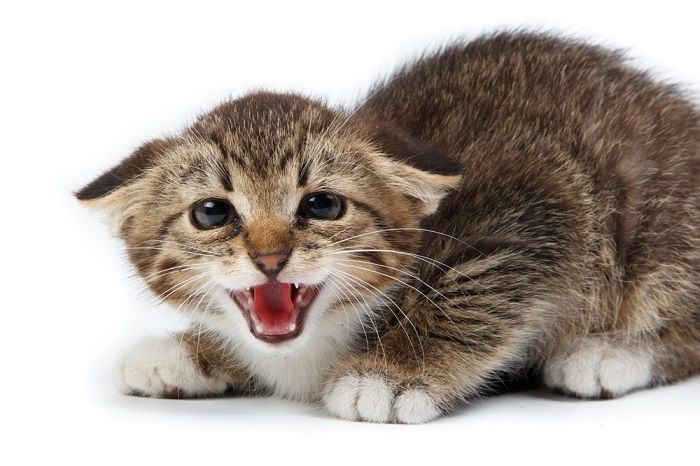
A formerly friendly cat that becomes aggressive could be sick or in pain.
An apparent change in your cat’s personality is definitely cause for concern and should prompt a checkup with their veterinarian to try and get to the bottom of the problem. There are a wide variety of causes for cats becoming agitated or showing aggression toward other animals or people:
- Pain
- Deterioration in vision or hearing, causing them to feel vulnerable
- Hyperthyroidism
- Hypertension (high blood pressure)
- Brain tumors
- Rabies (in certain geographical locations)
8. Hiding Away and Being Less Interactive
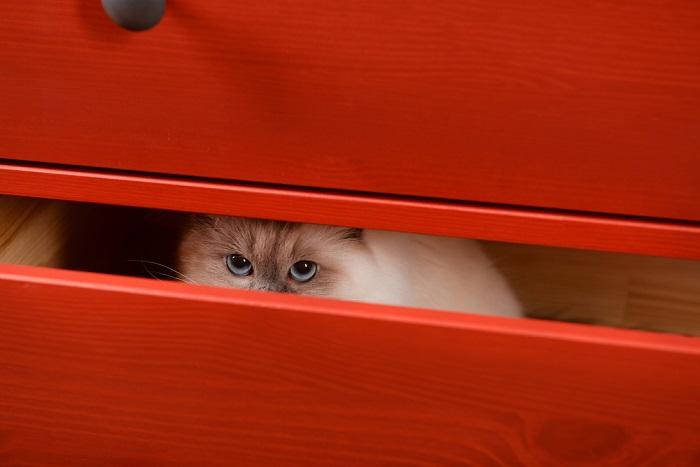
Cats often avoid interaction and hide away when they are feeling unwell.
Ill or painful cats tend to become withdrawn and hide, and often eat and drink less than normal. Painful cats might play less with toys and interact less with their owners. Cats suffering from anxiety and stress might also find a quiet spot away from household hustle and bustle (especially if the source of stress is another animal in the house, a new baby, small kids, or visitors).
There are plenty of strategies your veterinarian can suggest to help cats suffering from stress if that is thought to be the cause of their abnormal behavior, sometimes in conjunction with a feline behaviorist.
A Note on Stress
Many people are skeptical when it is suggested that their cat’s behavioral changes could be caused by stress—after all, most cats appear to live a charmed life, with all their apparent needs met by doting owners. The following list is just some of the many things that can cause stress to cats:
- A new pet, child, or adult in the household
- Unfamiliar visitors
- Change of routine such as building works, or being cared for by a house sitter
- Moving house
- Conflict with other cats, both in the household and outside
- Unsuitable positioning of resources such as food, water, and litter boxes
Also Read: Can Cats Sense Danger?
9. Not Jumping Up as Usual
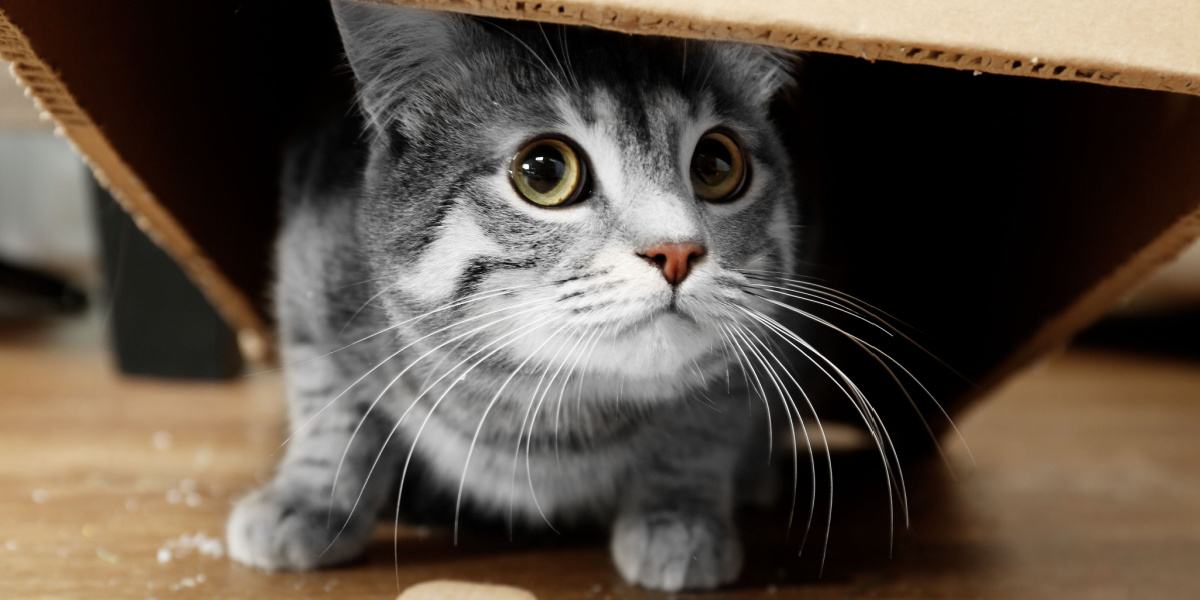
One of the early signs of arthritis in older cats is a reluctance to jump and climb as they used to.
Take action if you notice that your cat stops going up the stairs, struggles to climb the fence, or stops jumping up to their favorite elevated bed or feeding station. In extreme cases, where this behavior has come on very quickly, they could have an injury such as a broken bone or sprain.
Many older cats with arthritis change their behavior as they are too painful to jump and climb as they used to. Whether their change in mobility is subtle or dramatic, always get your cat examined by a veterinarian to ensure they get the treatment they need.
Also Read: How To Keep Your Cat From Jumping After Surgery
Behavior Changes: Final Thoughts

Medical conditions, pain, stress, and anxiety can all cause behavioral changes in cats.
All cats have individual quirks, and owners often wonder if their pet’s odd behaviors are normal. Medical disorders can often cause behavioral changes, as can pain, stress, and anxiety. It is important to always take notice of any changes in your cat’s normal behavior, and get them checked over by a veterinarian to see if there is anything to worry about.
Also Read: Why Is My Cat Sniffing Everything All Of A Sudden?
-
Kaleta T., Borkowska N., Goral-Radziszewska K. The study of domestic cat (Felis catus) personality based on survey in Poland. Anim. Sci 2016; 55(1):33-46.
-
Sordo Sordo, L., Breheny, C., et al (2020). Prevalence of Disease and Age-Related Behavioural Changes in Cats: Past and Present. Veterinary Sciences, 7(3). https://doi.org/10.3390/vetsci7030085
-
https://www.cats.org.uk
-
https://www.hillspet.com
-
https://www.petmd.com
